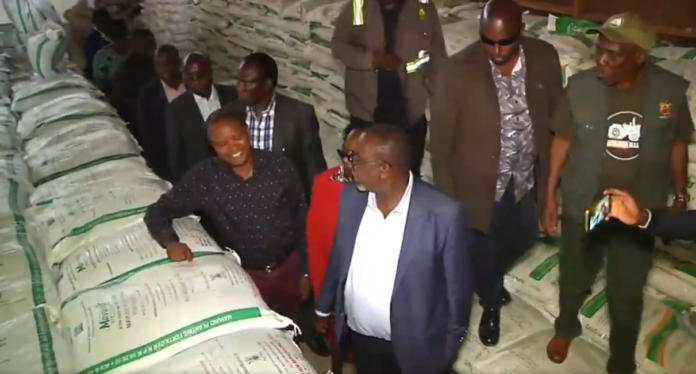President William Ruto’s administration faces intense scrutiny following revelations of government officials distributing counterfeit subsidized fertilizer nationwide, sparking concerns over food security in Kenya.
Agriculture cs @mithika_Linturi – " We are a responsible government, and we can not compromise on the quality of fertilizer. Do not listen to the stories being peddled around about FAKE FERTLIZER…." #SystemYaFacts pic.twitter.com/V5usOXa8xB
— -Dennis Itumbi, CBS (@OleItumbi) March 27, 2024
The Kenya Bureau of Standards (KEBS) recently confirmed the presence of fake subsidized fertilizer, known as GPC Plus Organics, in the market. This revelation came after an exposé revealed the circulation of the counterfeit product, packaged in 25kg bags.
Agriculture Ministry Officials Issue Conflicting Directives on the Sale of Subsidized Fertilizer
KEBS Managing Director Esther Ngari disclosed that the National Cereals and Produce Board (NCPB) was involved in selling the counterfeit fertilizer, despite lacking KEBS’ seal of approval. Ngari highlighted that the substandard fertilizer had been unknowingly purchased by farmers for several months, prompting KEBS to impound 5,840 bags across the country.
Kalonzo Alleges Kenya Kwanza’s Conspiracy to Halt NADCO Report Implementation
In response, Agriculture Minister Mithika Linturi assured farmers of ongoing investigations, promising legal repercussions for culpable officials. Linturi defended the authenticity of most subsidized fertilizers, accusing the opposition of politicizing the issue to incite public unrest.
However, criticism mounts against Linturi, with the opposition coalition Azimio la Umoja demanding his resignation over allegations of economic sabotage. Opposition leader Kalonzo Musyoka condemned the government’s failure to fulfill promises to farmers, denouncing the sale of “poison” disguised as fertilizer.
Students Injured in Moi University Bus Accident on Naivasha-Nairobi Highway
Distressed farmers express fears of reduced maize production due to the fake fertilizers, exacerbating food insecurity in regions like the North Rift and Western Kenya. Many, like Peter Awusa and George Agutu, recount their harrowing experiences of purchasing counterfeit fertilizer and demand government compensation for their losses.
Amidst concerns over food scarcity affecting over 1.6 million Kenyans, agricultural pressure groups warn of dire consequences if the circulation of fake fertilizers persists. Ann Maina, national coordinator at Route to Food, blames authorities for complicity in perpetuating the crisis, emphasizing the urgent need for corrective action to safeguard food security and public health.
DCI Vehicles Reportedly Involved in Dumping Bodies in Aberdares
With millions of Kenyans facing food insecurity, restoring trust in agricultural inputs and addressing corruption within the sector are paramount to ensuring a sustainable and secure food supply for all citizens


